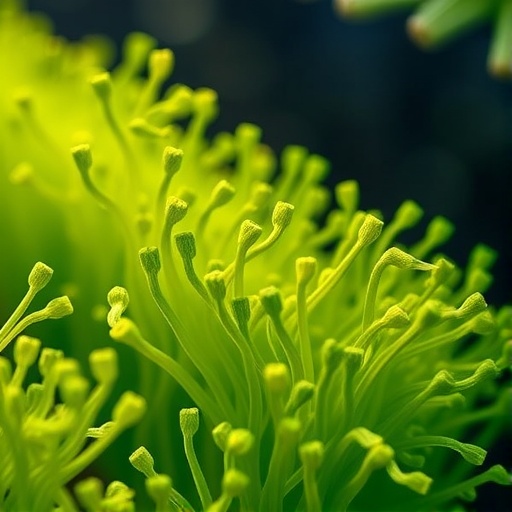In an enlightening study recently published, researchers have illuminated an unexpected finding regarding the interaction between elevated carbon dioxide (CO2) levels and macroalgal communities. Conducted by Wada et al., the research published in Commun Earth Environ opens a critical dialogue about ecological responses to climate change, specifically focusing on marine photosynthetic organisms. Contrary to prevalent hypotheses that suggest increased CO2 leads to enhanced photosynthesis in aquatic ecosystems, this groundbreaking study finds no significant increase in the photosynthetic rates of macroalgal communities in response to higher atmospheric CO2.
As one of the primary producers in marine ecosystems, macroalgae play a crucial role in carbon cycling and energy provisioning for various marine life forms. The assumption that rising CO2 concentrations would stimulate macroalgal photosynthesis has fueled extensive research interest, as it raises implications for both ecological balance and global carbon dynamics. However, the findings presented by Wada and colleagues challenge this narrative, insisting on the complexity of biological responses to escalating greenhouse gas concentrations.
Using manicured experimental designs, the researchers monitored the photosynthetic performance of diverse macroalgal species subjected to elevated CO2 levels. This study’s methodology incorporated various control and treatment groups, allowing for rigorous comparisons and evaluations. The experimental settings simulated real-world conditions typical of marine environments, providing an insightful perspective on how macroalgal photosynthesis responds to environmental changes taking place due to climate change.
The team’s data collection involved meticulous measurements over extended periods, capturing variations in photosynthetic responses across different macroalgal species. Comprehensive laboratory and field experiments were conducted to assess the effects of increased CO2 concentrations in isolated sites known for their rich macroalgal diversity. Their results indicated that the anticipated enhancement in photosynthesis was not only absent but also inconsistent across different macroalgal communities.
Macrophytic algae, known for their significant role in coastal ecosystems, often serve as indicators of environmental health, and their interactions with various stressors, including nutrient availability and light intensity, build a complex narrative around climate adaptation. However, it was revealed that the photosynthetic mechanisms in these organisms are more intricate than previously assumed. Competing factors like nutrient limitation and light competition appeared to overshadow any potential positive impacts attributable to elevated CO2 levels, suggesting a resistance to change rooted in evolutionary biology.
Additionally, Wada and his team meticulously accounted for external environmental variables with potential effects on plant physiology. Their research highlighted the pressing need to critically reassess how biogeochemical cycling might be affected in the current climate crisis. Perhaps most crucially, the study raised meaningful questions about the reliability of macroalgal responses to environmental threats and their implications for carbon sequestration strategies.
The findings further assert that the general assumption of increased CO2 benefiting marine producers might be simplistic. While CO2 plays a fundamental role as a substrate for photosynthesis, its influence on oceanic carbon uptake can also be modulated by other stressors, emphasizing the significance of a more holistic understanding of marine ecosystems. Such intricacies are critical for developing sustainable fisheries and managing marine resources effectively in the face of climate change.
As researchers sift through these findings, the implications extend beyond macroalgae alone. The study sets the stage for further inquiry into various marine photosynthetic organisms, including seagrasses and phytoplankton. Delving deeper into understanding the nuances of how different species react to climate variations may enlighten conservation strategies aimed at safeguarding marine biodiversity for future generations.
In light of these advancements, environmental policy makers are urged to develop strategies that integrate these new insights. Global marine management must adapt to the evidence emerging from cutting-edge scientific research that highlights the disconnect between anticipated and actual responses of marine ecosystems to climate variables. Future conservation programs geared toward enhancing marine productivity should consider these findings as a cornerstone in formulating accurate models that project the future of marine life under climate pressure.
The urgent call for a refashioned dialogue around marine ecosystems and carbon dynamics positions this research as a pivotal proponent in oceanographic studies. Wada et al.’s work fosters a dynamic comprehension of the intricate relationships underpinning marine life and their responses to anthropogenic pressures. Such insight not only enriches scientific discourse but also serves as a clarion call to broader environmental stewardship aimed at sustaining our planet’s vital ocean resources in a warming world.
Ultimately, the groundbreaking findings of Wada and his colleagues provide critical knowledge necessary for comprehending the broader implications of elevated carbon dioxide levels in marine ecosystems. As researchers continue to unravel the complex interactions between climate change and marine life, it becomes increasingly clear that a nuanced understanding is essential for effective management and preservation efforts. The collaborative synthesis of this knowledge among scientists, policymakers, and the public lays a vital groundwork for the sustainable future of our oceans and the myriad species relying on them.
Thus, as the academic community grapples with the implications of this research, the discourse surrounding climate change’s impact on marine productivity is poised to evolve profoundly. Fueled by curiosity and empirical evidence, it will guide future studies and inform pragmatic environmental policies that align with the latest scientific understanding. Emphasizing vigilance, adaptability, and transformative actions, Wada et al.’s findings underscore the urgent need for coherent strategies that encompass the multifaceted challenges our oceans face in the wake of global change.
This robust dialogue and ensuing research into macroalgal responses amid rising CO2 levels will undoubtedly resonate within both scientific and public spheres, shaping not just academic pursuits but also the environmental resilience of our blue planet.
Subject of Research: The impact of elevated carbon dioxide on macroalgal community photosynthesis.
Article Title: Elevated carbon dioxide does not increase macroalgal community photosynthesis.
Article References:
Wada, S., Kurosawa, S., Agostini, S. et al. Elevated carbon dioxide does not increase macroalgal community photosynthesis. Commun Earth Environ 6, 840 (2025). https://doi.org/10.1038/s43247-025-02730-2
Image Credits: AI Generated
DOI:
Keywords: Climate Change, Macroalgae, Carbon Dioxide, Photosynthesis, Marine Ecosystems, Ecological Dynamics.




